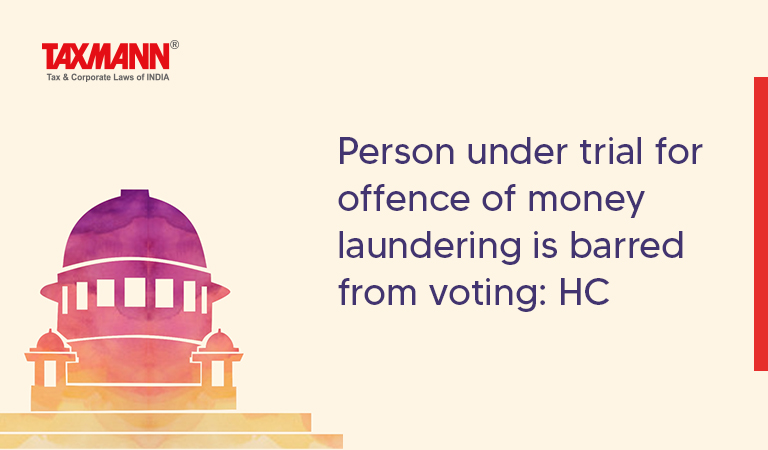Person under trial for offence of money laundering is barred from voting: HC
- Blog|News|FEMA & Banking|
- 3 Min Read
- By Taxmann
- |
- Last Updated on 20 September, 2022

Case Details: Mohammad Nawab Mohammad Islam Malik @ Nawab Malik v. Directorate of Enforcement - [2022] 142 taxmann.com 179 (HC-Bombay)
Judiciary and Counsel Details
-
- N.J. Jamadar, J.
- Amit Desai, Sr. Adv., Kushal Mor, Gopalkrishna Shenoy, Taraq Sayyed, Rohan Dakshini, Ms Pooja Kothari, Tejas Popat, Ms Neha Sonawane, Vikram Choudhary, Sr. Adv, Inderpal Singh, Aniket Nikam, Hargun Sandhu, M.B. Shirsat, Ms Devyani Chemburkar & Ms Swati Acharya for the Applicant.
- Anil C. Singh, Addl. Solicitor General, Aditya Thakkar, Shriram Shirsat, D.P. Singh, Pranav Thakur, Ms Smita Thakur, Amandeep Singh, Sra Amar Qureshi & Pandurang H. Gaikwad, App for the Respondent.
Facts of the Case
In the instant case, the applicant was a member of the Maharashtra Legislative Assembly. He was in custody since 23.02.2022 for an offence punishable under section 3 of the Prevention of Money Laundering Act, 2002. The applicant, with a view to exercising the right to vote in Rajya Sabha Biennial Elections, had preferred an application for release on bail to cast vote in the said election.
The applicant claimed that he had a constitutional duty to cast vote in the said election. However, the Special Judge rejected the said application in view of section 62(5) of the Representation of the People Act, 1951, which prohibits a person to vote at any election if he was confined in prison.
The applicant claimed that he couldn’t be precluded from discharging the constitutional duty and, thus, made an endeavour to persuade the instant Court to grant alternative prayer to allow him to cast vote by facilitating his presence at Vidhan Bhavan, under escort.
High Court Held
The High Court observed that if the Parliament has declared that a person who is incarcerated, otherwise than as a detenue under preventive detention law, is not entitled to vote at an election, the said prescription would govern the rights and duties of Members of Legislative Assembly as electors.
The High Court, further observed that since the purity of the electoral process and probity of participants therein, are of equal significance in strengthening democratic principles and one of the objects of prohibition envisaged by section 62(5) is stated to be preventing the criminalization of politics, permitting persons (who are otherwise not qualified to vote in an election) would not strengthen democracy.
The High Court held that there is no unfettered discretion, even in Courts, to remove the embargo created by section 62(5) of the Representation of People Act, 1951 by permitting a person in custody to cast vote.
In view of the above, even alternative prayer to exercise discretion to allow the applicant to cast vote, whilst being in custody, didn’t merit acceptance as it would amount to permitting the applicant to achieve results indirectly, which he couldn’t do directly.
Accordingly, the appeal was to be dismissed.
List of Cases Referred to
-
- Anukul Chandra Pradhan v. Union of India [1997] 6 SCC 1 (para 11)
- S. Radhakrishnan v. Union of India [W.P. (c) No. 1028 of 1990, dated 17-8-1999] (para 17)
- Praveen Kumar Chaudhary v. Election Commission of India [W.P. (c) No. 2336 of 2019, dated 11-2-2020] (para 18)
- Manohar Lal Sharma v. Union of India [2014] SCC Online Delhi 570 (para 18)
- Rajbala v. State of Haryana [2016] 2 SCC 445 (para 21)
- Kalyan Chandra Sarkar v. Rajesh Ranjan @ Pappu Yadav [2005] 3 SCC 311 (para 24)
- Mohd. Shahabuddin v. State of Bihar [2007] 10 SCC 28 (para 24)
- Nalin Soren v. State of Jharkhand [SLP Appeal No. (Crl) No.(s) 5859 of 2013, dated 17-7-2013] (para 24)
- Ramesh Nagnath Kadam v. State of Maharashtra [Cri. W.P. No. 2638 of 2017, dated 14-7-2017] (para 24)
- Ramesh Nagnath Kadam v. State of Maharashtra [Criminal Writ Petition No. 4792 of 2019, dated 1-10-2019] (para 24)
- Ramesh Chandra Jena @ Ramesh Jena v. State of Orissa 2010 SCC Online Ori 304 (para 26)
- Dhullu Mahto v. State of Jharkhand [W.P. (Cr.) No. 72 of 2020, dated 18-6-2020] (para 26)
- Banwari Lal Kushwaha v. State of Rajasthan 2016 SCC Online Raj 3359 (para 27)
- Anurag Kumar Singh v. State of Uttarakhand [Civil Appeal No. 8334 of 2013, dated 5-10-2016] (para 33).
Disclaimer: The content/information published on the website is only for general information of the user and shall not be construed as legal advice. While the Taxmann has exercised reasonable efforts to ensure the veracity of information/content published, Taxmann shall be under no liability in any manner whatsoever for incorrect information, if any.

Taxmann Publications has a dedicated in-house Research & Editorial Team. This team consists of a team of Chartered Accountants, Company Secretaries, and Lawyers. This team works under the guidance and supervision of editor-in-chief Mr Rakesh Bhargava.
The Research and Editorial Team is responsible for developing reliable and accurate content for the readers. The team follows the six-sigma approach to achieve the benchmark of zero error in its publications and research platforms. The team ensures that the following publication guidelines are thoroughly followed while developing the content:
- The statutory material is obtained only from the authorized and reliable sources
- All the latest developments in the judicial and legislative fields are covered
- Prepare the analytical write-ups on current, controversial, and important issues to help the readers to understand the concept and its implications
- Every content published by Taxmann is complete, accurate and lucid
- All evidence-based statements are supported with proper reference to Section, Circular No., Notification No. or citations
- The golden rules of grammar, style and consistency are thoroughly followed
- Font and size that’s easy to read and remain consistent across all imprint and digital publications are applied



 CA | CS | CMA
CA | CS | CMA
